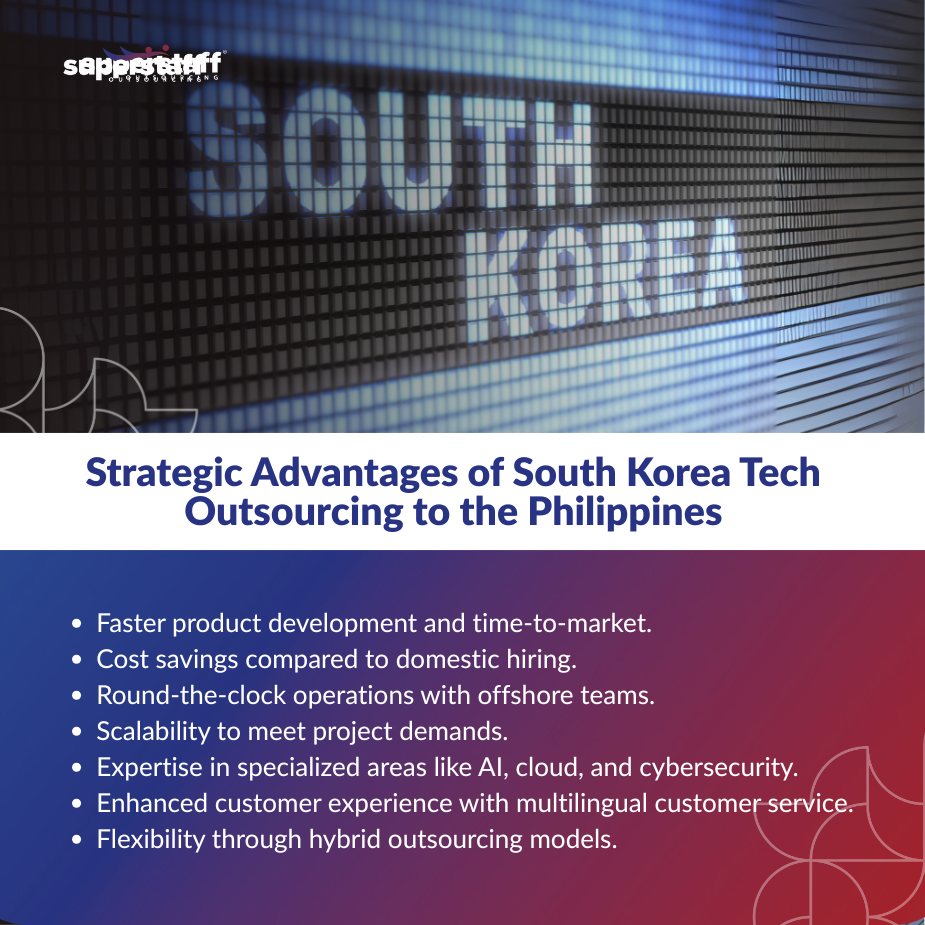
South Korea has long held its place on the global stage as a technology powerhouse, home to industry giants in semiconductors, electronics, gaming, and telecommunications. Known for rapid innovation cycles and cutting-edge R&D, the nation has set the standard for how advanced economies can harness technology to drive growth. Yet as the pace of global innovation accelerates, even South Korea faces new pressures: an acute shortage of highly skilled talent, rising labor costs, and the constant need to keep pace with emerging technologies like AI, cloud, and machine learning. These challenges have pushed many companies to rethink how they can sustain their leadership in an increasingly competitive market.
This is where South Korea tech outsourcing plays a pivotal role. By strategically leveraging international partnerships, South Korean companies gain access to global talent pools, speed up R&D cycles, and reduce costs—all while maintaining high levels of innovation. Outsourcing is no longer a stopgap measure but a core growth strategy. Whether through outsourcing global talent in South Korea or tapping into specialized skills abroad, companies are fueling the next era of K-Tech innovation.
In this blog, we’ll explore how global outsourcing partnerships–particularly in nations like the Philippines–are fueling South Korea’s next wave of tech innovation. From scaling R&D to accelerating product launches, we’ll uncover why outsourcing has become a cornerstone strategy for South Korean companies determined to stay ahead in the global race for innovation.
South Korea’s Tech Leadership Is Built on Continuous Innovation and Global Competitiveness
South Korea’s reputation as a global technology powerhouse is well-earned. The country consistently ranks among the top performers in innovation indexes such as the Bloomberg Innovation Index and the Global Innovation Index. Its exports—semiconductors, consumer electronics, and telecommunications equipment—account for a large portion of national GDP, making technology not just a growth driver but a cornerstone of the national economy.
The semiconductor industry alone is a critical sector, with South Korea’s Samsung and SK Hynix dominating the global memory chip market. In consumer electronics, South Korean products remain synonymous with quality and reliability, while the nation’s gaming industry is a cultural and economic force that continues to expand globally.
This tech leadership is supported by substantial government investment. South Korea’s government actively funds research and development, offering incentives to companies that push the boundaries of AI, clean technology, and advanced manufacturing. Programs such as the “Korean New Deal” initiative have earmarked billions for digital transformation, smart factories, and green technologies.
Yet, while South Korea remains a global innovation leader, it faces intensifying competition. Countries like China, the U.S., and members of the European Union are ramping up investments in AI, fintech, and clean energy. To retain its leadership, South Korea must innovate faster and more cost-effectively. South Korea tech outsourcing emerges as one of the most effective strategies to overcome these pressures and sustain long-term competitiveness.
To keep this competitive edge, local companies are seeking new strategies to overcome domestic constraints.
Talent Shortages and High Operational Costs Challenge South Korea’s Tech Growth
Despite its strengths, South Korea faces structural challenges that threaten its ability to scale innovation. Chief among them is the shortage of specialized tech talent. The country has fewer software developers and AI engineers compared to demand, creating bottlenecks for companies looking to expand in cutting-edge sectors.
In Seoul, the heart of South Korea’s tech ecosystem, competition for talent has driven salaries upward. While this benefits workers, it places additional strain on companies, particularly startups that cannot match the wage packages offered by larger conglomerates. This wage inflation makes it difficult for firms to scale operations sustainably.
Moreover, domestic hiring remains limited in scalability. South Korea’s aging population reduces the available talent pool, while younger workers often seek careers in established companies, leaving startups struggling to attract and retain skilled employees.
The result is a growing imbalance: South Korea has the technological ambition and investment power but lacks the human resources to fully execute on these opportunities.
This talent gap has opened doors for strategic global partnerships through outsourcing.

Global Outsourcing Offers South Korea the Agility and Expertise Needed to Innovate at Scale
The solution to these challenges lies in global collaboration. By engaging in outsourcing global talent in South Korea, companies can tap into diverse skill sets at a fraction of the cost of domestic hiring. Outsourcing provides flexibility, scalability, and, most importantly, speed—critical advantages in today’s fast-moving tech landscape.
Nearshore and offshore outsourcing models both hold promise. Nearshore outsourcing enables South Korean companies to collaborate with teams in similar time zones, while offshore partnerships—such as those with the Philippines or India—provide round-the-clock operations that ensure projects never stop moving forward.
The Philippines, in particular, plays a growing role in supporting South Korean businesses. Known globally for multilingual customer service, the Philippines also boasts a large pool of technical talent in fields such as software engineering, IT support, and cloud solutions. With strong English proficiency and cultural compatibility, Filipino teams are well-positioned to support South Korea’s technology companies.
Time zone alignment with North America and Europe further enhances the Philippines’ value as an outsourcing partner. South Korean companies benefit from nearly 24/7 coverage, allowing them to provide faster service to global customers while maintaining lean domestic operations.
Beyond operational efficiency, these partnerships are transforming how South Korean companies approach innovation.
Tech Outsourcing Accelerates R&D and Time-to-Market for South Korean Companies
In technology, speed is everything. Companies that innovate faster and bring products to market more quickly gain a significant competitive edge. For South Korea, outsourcing has become an effective tool to accelerate R&D pipelines and reduce development bottlenecks.
Outsourced teams contribute to every stage of the innovation cycle. In software engineering and app development, outsourcing allows South Korean firms to access international developers who can build, test, and refine applications at scale. When it comes to cloud solutions and cybersecurity, outsourced specialists provide expertise that ensures infrastructure remains secure and scalable.
Perhaps most importantly, outsourcing supports advanced projects in artificial intelligence and machine learning. Training algorithms requires massive amounts of data annotation—a task that can be efficiently outsourced to global teams. By leveraging offshore talent, South Korean startups and enterprises alike can focus on strategy and innovation while partners handle the execution-heavy aspects of research and development.
This model demonstrates how K-Tech uses international developers not just as support, but as core contributors to innovation. By combining domestic R&D leadership with outsourced execution, South Korea ensures faster prototyping, more efficient beta testing, and smoother scaling of new technologies.
The impact of outsourcing goes beyond speed—it’s shaping the future direction of South Korean innovation.
Why the Philippines Stands Out as a Preferred Partner for South Korea Tech Outsourcing
Among outsourcing destinations, the Philippines holds a unique advantage for South Korean companies. With decades of experience in outsourcing services, the country has built a reputation for reliability, scalability, and technical expertise.
The Philippines’ proven track record in high-tech industries positions it as an ideal partner for South Korean companies. Filipino professionals offer cost-effective operations without compromising quality, giving South Korean firms the ability to scale efficiently. Beyond traditional customer service, the Philippines has developed growing expertise in specialized IT and AI services, making it an attractive partner for companies seeking both breadth and depth of talent.
The cultural compatibility between South Korea and the Philippines also strengthens collaboration. Shared values of respect, work ethic, and adaptability make it easier for South Korean managers to integrate outsourced teams into their operations.
Partnering with the right outsourcing provider ensures these benefits translate into sustained innovation.
Building Effective South Korea–Global Outsourcing Partnerships Requires a Strategic Approach
While outsourcing offers significant advantages, success depends on strategy. South Korean companies must approach outsourcing with clear goals and integration plans.
The most effective partnerships are built on transparent communication and cultural training, ensuring teams align across borders. Setting measurable KPIs for innovation, delivery timelines, and customer satisfaction helps maintain accountability and ensures outsourcing contributes directly to business objectives.
Hybrid models—where domestic leadership drives strategy while outsourced teams execute specialized tasks—can maximize the benefits of outsourcing. By blending local leadership with global execution, South Korean firms can scale faster without sacrificing quality or control.
When executed well, these partnerships create a multiplier effect on innovation capacity.
South Korea Tech Outsourcing to the Philippines: A Gateway to Growth for SK Tech Companies
Tech outsourcing is no longer just a tactical option—it is becoming a strategic pillar in South Korea’s innovation journey. By outsourcing global talent in South Korea and abroad, companies are overcoming domestic talent shortages and cost pressures while gaining the speed and expertise needed to stay competitive.
Global partnerships, particularly with destinations like the Philippines, deliver the agility, scalability, and multilingual customer service capabilities that align perfectly with South Korea’s ambitions in next-generation technology.
From demonstrating how K-Tech uses international developers to drive R&D, to showcasing how outsourcing accelerates customer experience and global expansion, the benefits are clear: outsourcing fuels innovation.
South Korea’s tech industry has always been defined by its ability to adapt, evolve, and lead. In today’s rapidly changing global market, the next chapter of that leadership will be written in collaboration with global outsourcing partners.
South Korean tech leaders looking to strengthen their innovation capacity should explore partnerships with outsourcing providers like SuperStaff. By harnessing global talent, they can fuel the next leap forward in K-Tech’s global journey.






